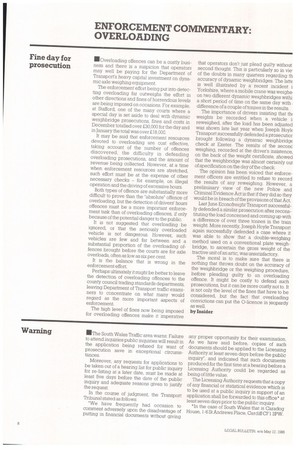ENFORCEMENT COMMENTARY: OVERLOADING
Page 38

If you've noticed an error in this article please click here to report it so we can fix it.
Fine day for prosecution
• Overloading offences can be a costly business and there is a suspicion that operators may well be paying for the Department of Transport's heavy capital investment on dynamic axle weighing equipment.
The enforcement effort being put into detecting overloading far outweighs the effort in other directions and fines of horrendous levels are being imposed on occasions. For example, at Stafford, one of the many courts where a special day is set aside to deal with dynamic weighbridge prosecutions, fines and costs in December totalled over £30,000 for the day and in January the total was over £18,000.
It may be said that enforcement resources devoted to overloading are cost effective, taking account of the number of offences discovered, the difficulty in defending overloading prosecutions, and the amount of revenue being collected, However, at a time when enforcement resources are stretched, such effort must be at the expense of other necessary checks for example, on illegal operation and the driving of excessive hours.
Both types of offence are substantially more difficult to prove than the "absolute" offence of overloading, but the detection of drivers hours offences must be a more important enforcement task than of overloading offences, if only because of the potential danger to the public.
It is not suggested that overloading be ignored, or that the seriously overloaded vehicle is not dangerous. However, such vehicles are few and far between and a substantial proportion of the overloading offences brought before the courts are for axle overloads, often as low as six per cent.
It is the balance that is wrong in the enforcement effort.
Perhaps ultimately it might be better to leave the detection of overloading offences to the county council trading standards departments, leaving Department of Transport traffic examiners to concentrate on what many would regard as the more important aspects of enforcement.
The high level of fines now being imposed for overloading offences make it imperative that operators don't just plead guilty without second thought. This is particularly so in vie. of the doubts in many quarters regarding th accuracy of dynamic weighbridges. The lattE is well illustrated by a recent incident i Yorkshire, where a mobile crane was weighe on two different dynamic weighbridges withi a short period of time on the same day with difference of a couple of tonnes in the results, The importance of drivers insisting that th( weights be recorded when a vehicle reweighed, after the load has been adjusted was shown late last year when Joseph HoylE Transport successfully defended a prosecutior brought following a dynamic weighbridgE check at Exeter. The results of the seconc weighing, recorded at the driver's insistence, on the back of the weight certificate, showed that the weighbridge was almost certainly out of specification on the day of the check.
The opinion has been voiced that enforcement officers are entitled to refuse to record the results of any reweighing. However, a preliminary view of the new Police and Criminal Evidence Act is that if they did so they would be in breach of the provisions of that Act.
Last June Econofreight Transport successfully defended a similar prosecution after reconstituting the load concerned and coming up with a difference of over three tonnes in the train weight. More recently, Joseph Hoyle Transport again successfully defended a case where it was able to show that a double-weighing method used on a conventional plate weighbridge, to ascertain the gross weight of the tractive unit of an artic, was unsatisfactory.
The moral is to make sure that there is nothing that throws doubt on the accuracy of the weighbridge or the weighing procedure, before pleading guilty to an overloading offence. It might be costly to defend such prosecutions, but it can be more costly not to. It is not only the level of the fines that have to be considered, but the fact that overloading convictions can put the 0-licence in jeopardy as well.
by Insider






















































































